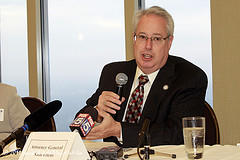
Section Branding
Header Content
Open Meetings Violation Filed
Primary Content

The state is accusing Cumming’s mayor of violating the Open Meetings and Records Act by preventing a resident from filming a city council meeting.
In a civil complaint filed this week, Georgia attorney general Sam Olens says Mayor H. Ford Gravitt told resident Nydia Tisdale she couldn’t record an April council meeting. He then asked a policeman to forcibly remove her.
Tisdale recorded the exchange and posted the video to YouTube. In the video, she cites the state’s Sunshine law.
“We don’t allow filming in the city hall here," Gravitt is heard saying on the video. "That’s just for civic reasons. So if you would, remove the camera.”
“You’ll have to move it outside,” a policeman tells Tisdale.
“Respectfully, Mayor, Georgia’s Sunshine law…under Georgia law---" Tisdale says.
“If we’re going to have a discussion, can I have the camera removed?” Gravitt responds.
Tisdale tries to explain why she's taping the meeting.
"I’m exercising my right as a citizen to record this meeting,” she says, while the policeman ushers her out of the meeting.
The state legislature overhauled the Open Records and Meetings Act this year. Under the new law, citizens bringing complaints no longer have to prove elected officials intended to violate the law.
Holly Mannheimer heads Georgia's First Amendment Foundation. She says that's a significant change from the previous law.
“Before the only way for a citizen to prevail in an open meetings or records claim was to show that the public agency willfully, knowingly and with intent violated the Sunshine laws," she said. "Now the standard is less than that. And that’s a big deal for Georgians.”
The state's suit against Gravitt is the first it's filed under the revised Sunshine Law, and it signals a new eagerness to prosecute elected officials.
Gravitt's alleged attempt to prevent Tisdale from recording the meeting and her subsequent removal were already violations under the old open meetings and records act. Under the new law, the state can go after elected officials with civil charges, which require a lower standard of proof.
Olens, the attorney general, pushed for the overhaul and helped draft the bill. He says the new law puts an emphasis on open meetings violations.
“These things are fairly common and they need to stop," he said in a telephone interview. "When we started talking about a rewrite, we went from about 250 complaints each year in my office to over 400. It’s my hope the elected officials take the time to learn more about the law and that they follow it.”
The attorney general's office has held workshops for elected officials who want to learn about the new law. But he rejects the idea that Gravitt didn't know what he was doing.
"The gentleman's been in office for decades," Olens said in an interview. "When mayors and county commissioners are first elected, they have mandatory training and the training specifically covers the state's Sunshine laws. I know that because I've been through that training. In the course of his being a mayor for that long, I'm absolutely not willing to concede he didn't know the law. I think governments often try to intimidate their residents."
Olens was Chairman of the Cobb County Board of Commissioners from 2002 to 2010.
Gravitt couldn’t be reached for comment. He faces up to $6,000 in civil penalties.
Tags: Cumming, Sam Olens, Sunshine law, open meetings and records act, Sunshine law overhaul, H. Ford Gravitt
